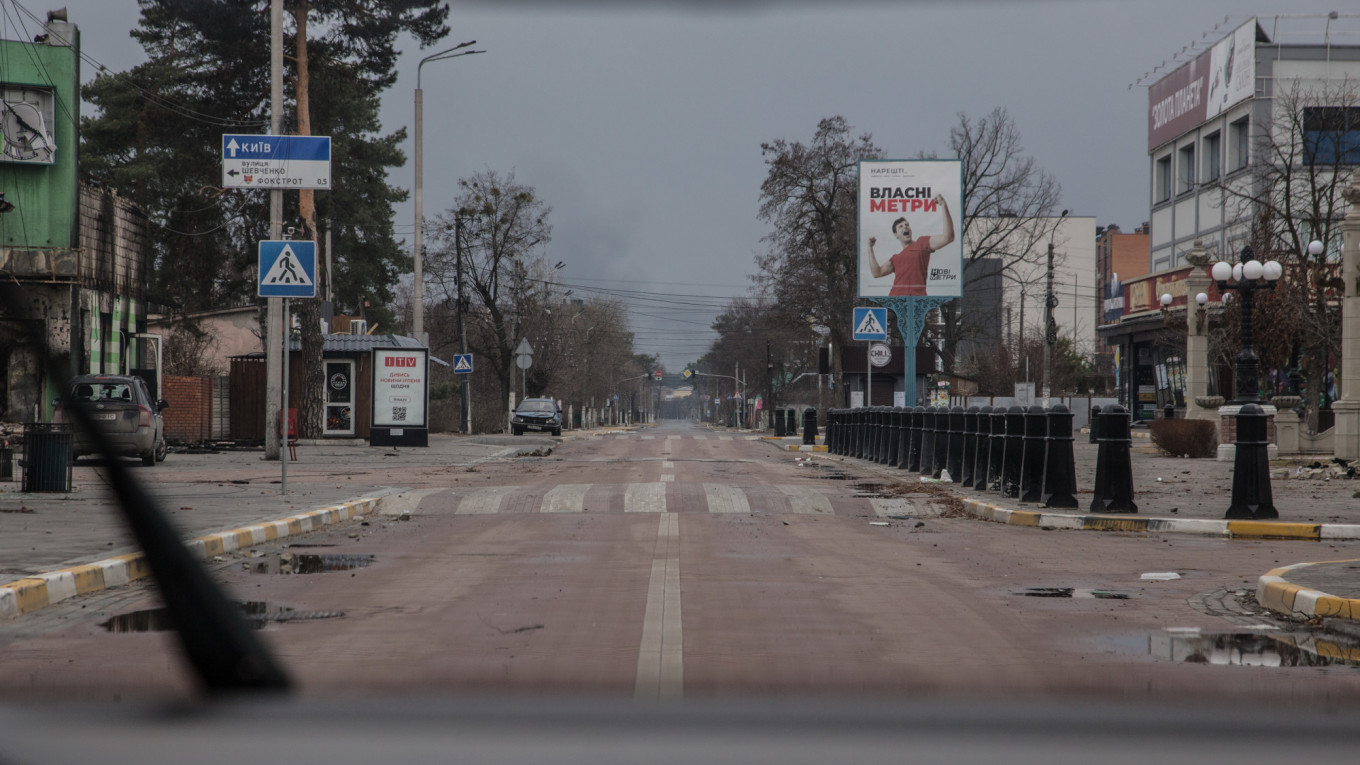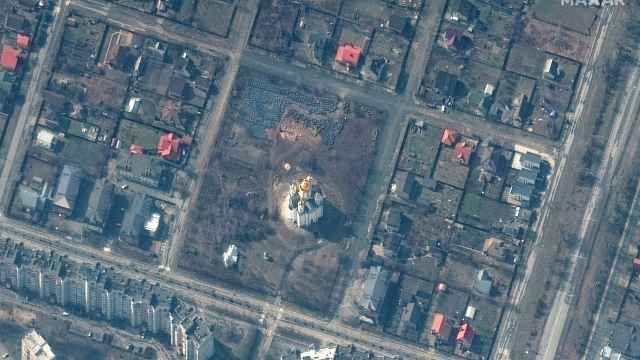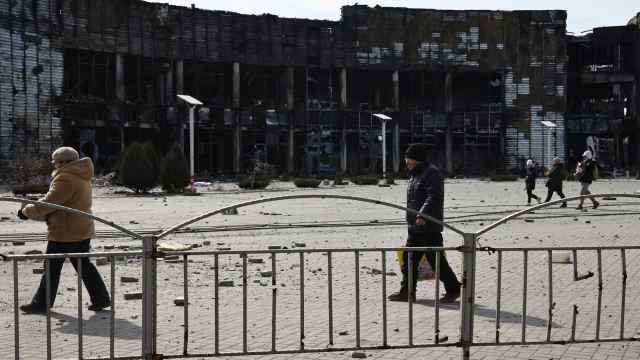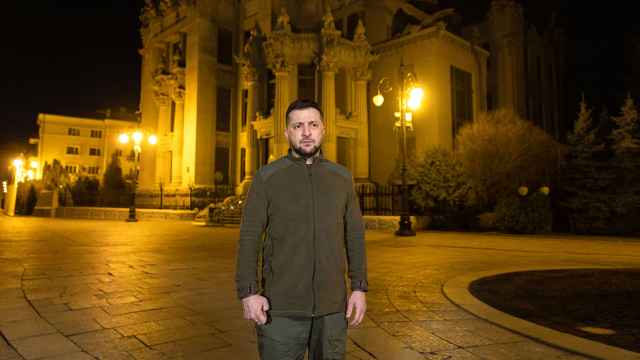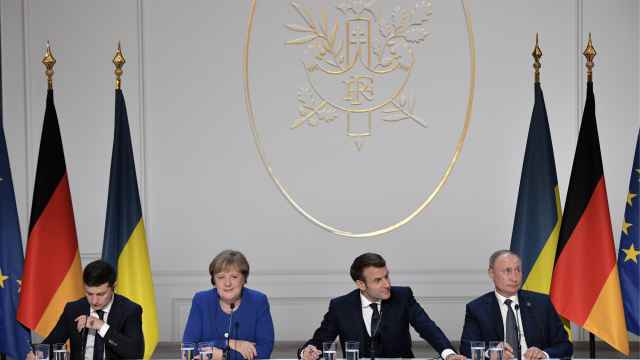Ukraine's President Volodymyr Zelensky warned Russia is consolidating and preparing "powerful strikes" in the country's east and south, including besieged Mariupol, where a new attempt will be made Friday to evacuate civilians from the devastated city.
Russia meanwhile threatened to turn off its gas taps to Europe if payments are not made in rubles, as U.S. President Joe Biden ordered a record release of strategic oil reserves to ease soaring U.S. prices.
In peace talks this week, Russia said it would scale back attacks on the capital Kyiv and the city of Chernigiv, but Ukrainian and Western officials have dismissed the pledge, saying Moscow's troops were merely regrouping.
"This is part of their tactics," said Zelensky in a late-night address.
"We know that they are moving away from the areas where we are beating them to focus on others that are very important... where it can be difficult for us," he said.
In particular, he warned, the situation in the country's south and east was "very difficult."
"In Donbas and Mariupol, in the Kharkiv direction, the Russian army is accumulating the potential for attacks, powerful attacks," he said.
Washington echoed that assessment, with a senior U.S. defense official saying Russia's focus on Donbas could herald a "longer, more prolonged conflict."
Military experts believe that Moscow is ditching efforts to advance simultaneously along multiple axes in the north, east and south, after struggling to overcome stronger-than-expected Ukrainian resistance.
Instead it wants to establish a long-sought land link between Crimea, which Moscow occupied in 2014, and the two Russian-backed Donbas statelets of Donetsk and Lugansk.
'Civilians desperately wanting to flee'
Mariupol is the main remaining obstacle to that ambition, and Russian forces have encircled and relentlessly bombarded the city to try to capture it.
Instead, it has been reduced to rubble, with tens of thousands of civilians trapped inside with little food, water or medicine.
Previous attempts to evacuate residents have collapsed, though some have made the dangerous dash to freedom alone, but on Friday Russia says it will allow a humanitarian corridor organized by the International Committee of the Red Cross (ICRC).
The ICRC's Ukraine delegation said on Twitter it was in nearby Zaporizhzhia, where buses from the encircled city are meant to arrive.
"We hope to be able to facilitate safe passage for civilians desperately wanting to flee Mariupol. We are also here with two trucks of assistance, hoping that we can also get assistance in," the organisation's Lucile Marbeau said in a video.
"In these trucks there is food, medicine, relief items, for those civilians who decide to stay," she added.
Russia has moved about 20% of its troops from around Kyiv but its strikes have continued and troops are likely "going to be repositioned, probably into Belarus, to be refitted and resupplied and used elsewhere in Ukraine," said Pentagon spokesman John Kirby.
Russian troops have also pulled back from the Chernobyl nuclear plant after weeks of occupation, but have taken a number of captive Ukrainian servicemen with them, according to officials in Kyiv.
And in a sign that the war could be expanding in scope, a Russian official said Friday that Ukrainian helicopters had carried out a strike on a fuel depot in the Russian town of Belgorod, some 30 kilometers (19 miles) from the border with Ukraine.
Western intelligence has claimed Putin's advisors may be "afraid to tell him the truth" and Biden suggested some advisors may even have been placed under house arrest, though he cautioned "there's a lot of speculation."
'I hope all this will end soon'
Kremlin spokesman Dmitry Peskov hit back, saying Western officials "don't understand President Putin, they don't understand the mechanism for taking decisions and they don't understand the style of our work."
With his economy crippled by unprecedented international sanctions, Putin has sought to leverage Russia's status as an energy power, and warned Thursday that EU members will need to set up ruble accounts from Friday to pay for his country's gas.
"If such payments are not made, we will consider this a breach of obligations on the part of our buyers" and existing contracts would be stopped, Putin said.
The EU has joined the United States in imposing sanctions, and European Parliament President Roberta Metsola is expected in Kyiv soon in a show of support.
But the bloc has not imposed an energy embargo, and Germany, which imported 55% of its gas supplies from Russia before the war, insisted it will pay in euros or dollars as stipulated in contracts.
Berlin and Paris were also "preparing" for Russian gas to simply stop flowing, France's economy minister said.
Biden meanwhile moved to mitigate rising domestic fuel prices by announcing a release from strategic US reserves of a million barrels daily for six months.
The record release amounts to augmenting global supplies by about one percent.
Peace talks between Ukrainian and Russian officials were expected to resume via video on Friday, with Kyiv negotiator David Arakhamia saying Turkey and Germany had offered to serve as security guarantors in any eventual agreement.
On the ground around Kyiv, Ukrainian forces have continued to push back Russian troops, capturing territory on the outskirts of the capital as Moscow's advance stalls.
Zelensky praised the advances, but said he was stripping two generals of their ranks for unspecified offenses.
"Right now I don't have time to deal with all the traitors, but gradually all of them will be punished," he said.
Civilians have been trickling out of devastated areas, including three-year-old Karolina Tkachenko, who was helped over a pipeline east of Kyiv by Ukrainian troops as she and her family escaped.
"The shops are closed, there's no delivery of supplies. The bridge is also blown up, we can't go for the groceries through there," said her mother Karina, holding her daughter in a pink bobble hat in her arms.
"I hope all this will end soon, and I will go back to my work."
A Message from The Moscow Times:
Dear readers,
We are facing unprecedented challenges. Russia's Prosecutor General's Office has designated The Moscow Times as an "undesirable" organization, criminalizing our work and putting our staff at risk of prosecution. This follows our earlier unjust labeling as a "foreign agent."
These actions are direct attempts to silence independent journalism in Russia. The authorities claim our work "discredits the decisions of the Russian leadership." We see things differently: we strive to provide accurate, unbiased reporting on Russia.
We, the journalists of The Moscow Times, refuse to be silenced. But to continue our work, we need your help.
Your support, no matter how small, makes a world of difference. If you can, please support us monthly starting from just $2. It's quick to set up, and every contribution makes a significant impact.
By supporting The Moscow Times, you're defending open, independent journalism in the face of repression. Thank you for standing with us.
Remind me later.


